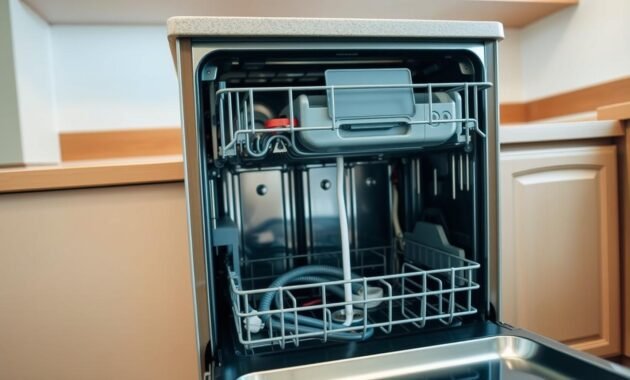
Kitchen appliance security is more than just stopping theft. It’s also about avoiding accidents. Many people don’t know that an unsecured dishwasher can move or tip. This could damage your kitchen and even hurt you.
Unsecured dishwashers can also break from water lines and cause electrical dangers. They might move unexpectedly while running.
I’ll show you how to keep your dishwasher safe and stable. With the right steps, you can avoid accidents and keep your kitchen in good shape.
Read also: Preventing the Water Heater Blow Up
Understanding Dishwasher Mounting Types
Installing a dishwasher needs the right mounting technique for a stable setup. Different models need specific mounting methods. These can change a lot between old and new appliances.
Dishwasher mounting is more than just putting an appliance in your kitchen. It’s about making a stable, secure connection. This prevents movement and damage. You’ll find two main mounting systems: side-mounting and top-mounting, each with its own needs.
Side-Mounting vs Top-Mounting Systems
Most dishwashers today use side-mounting systems. These systems have many benefits for installation and stability. They offer flexible attachment points and better support. Older dishwashers often used top-mounting.
- Side-mounting: Brackets attach to cabinet sides
- Top-mounting: Secured from the top of the appliance
- Newer models prefer side-mounting brackets
Identifying Your Dishwasher’s Attachment Points
It’s important to check your dishwasher model to find out how to mount it. Look for pre-drilled holes or existing brackets. Each maker has its own rules for mounting.
Common Mounting Hardware and Tools
To mount a dishwasher, you’ll need some tools and parts. You’ll need a drill, mounting brackets, screws, and a level for alignment.
- Drill with appropriate drill bits
- Mounting brackets specific to your dishwasher model
- Stainless steel screws
- Level
- Measuring tape
Knowing about mounting types and preparation will make your installation easier and more precise.
Signs Your Dishwasher Needs Securing

As a homeowner, it’s important to know when your dishwasher needs securing. A loose dishwasher is not just a hassle. It’s a safety risk that could cause serious damage or injury.
Here are some key warning signs that your dishwasher needs to be secured right away:
- Visible tilting when the door opens or closes
- Excessive movement during wash cycles
- Gaps between the dishwasher and surrounding cabinetry
- Unusual noises during operation
- Visible separation from countertop or cabinet
Understanding these warning signs is the first step in preventing dishwasher tipping. If your appliance moves unexpectedly or feels unstable, it’s time to act. An unsecured dishwasher can harm your flooring, break water lines, and pose electrical dangers.
I suggest doing a simple stability test: gently push and pull the dishwasher door. If it moves more than a fraction of an inch or feels shaky, you must secure it right away. You can either hire a professional or try a DIY solution to fix these problems safely and quickly.
Essential Safety Precautions Before Installation
When you’re about to install a dishwasher, keeping your kitchen safe is key. Safety is not just a suggestion; it’s a must to protect you and your home.
Let’s go over the most important safety steps. These will help make your installation smooth and safe.
Power and Water Supply Disconnection
First, make sure the dishwasher is not connected to power or water. Here’s how to do it:
- Find the circuit breaker panel in your home
- Turn off the circuit for the dishwasher
- Use a voltage tester to check for power
- Turn off the water supply valve under the sink
- Remove the water line from the dishwasher
Read also: Crack in a Fiberglass Tub and Shower Pan
Required Tools and Materials
| Safety Equipment | Purpose |
|---|---|
| Electrical safety gloves | Protect against electrical hazards |
| Safety glasses | Shield eyes from debris |
| Voltage tester | Confirm electrical disconnection |
| Adjustable wrench | Disconnect water lines safely |
Workspace Preparation Guidelines
Setting up a safe workspace is vital. Clear the area, make sure it’s well-lit, and keep it dry. Remove any tripping hazards and stay organized to avoid accidents.
- Clear the area completely
- Ensure good lighting
- Keep it dry
- Have a first aid kit nearby
- Wear the right protective gear
By taking these safety steps, you’ll have a solid base for your dishwasher installation.
How to Secure a Dishwasher: Step-by-Step Guide
Securing a dishwasher is key to a safe and stable installation. I’ll show you how to anchor your dishwasher to avoid accidents and damage.

First, pull the dishwasher out from under the counter. This lets you see the mounting points and the frame where brackets will go.
- Gather your mounting hardware and tools
- Locate the mounting points on the dishwasher frame
- Position mounting brackets carefully
- Secure brackets using appropriate screws
When securing your dishwasher, focus on the specific mounting needs. Different models have unique ways to attach, so check your manual for the right steps.
| Mounting Location | Recommended Fasteners | Difficulty Level |
|---|---|---|
| Side Cabinets | Wood Screws #8 x 1.5″ | Easy |
| Countertop | Mounting Brackets | Moderate |
| Floor Attachment | Concrete Anchors | Challenging |
Make sure to double-check each connection for a secure and level setup. Proper anchoring stops future movement and damage to your kitchen.
Installing Side-Mounting Brackets
Side-mounting brackets are key for a stable dishwasher. They keep your dishwasher from moving while it’s running. This is important for safety and efficiency.
Let’s go over how to install these brackets. It’s a step-by-step process that needs care and precision. This ensures your dishwasher is installed safely and right.
Bracket Placement Techniques
Where you place the bracket is very important. Here’s what to do:
- Find the pre-drilled holes on the dishwasher’s side
- Match the bracket with these holes carefully
- Make sure the bracket is level and fits the dishwasher frame well
- Mark where to screw the cabinet
Securing to Adjacent Cabinets
To lock your dishwasher to the cabinet, follow these steps:
- Drill holes where you marked
- Use the right screws for your cabinet
- Secure the bracket to the cabinet
- Check if the dishwasher moves or wobbles
Final Adjustments and Testing
After setting up the brackets, do a final check. Push and pull the dishwasher gently. It should stay put without moving much. If it does, tighten the screws.
A well-secured dishwasher is safe and works better. It also prevents damage to your kitchen.
Securing Dishwasher to Granite Countertops
Granite countertops are tricky to secure a dishwasher to. You can’t just drill into them like you would other surfaces. As a pro, I’ve learned special ways to install dishwashers on granite without damaging it.
Securing a dishwasher to granite requires special methods. These methods ensure your dishwasher is installed safely without harming the expensive stone.
- Use specialized mounting brackets designed for stone surfaces
- Apply industrial-strength adhesive mounting systems
- Create custom bracket adaptations
- Utilize side-mounting techniques that avoid direct granite contact
I suggest looking into mounting kits made for natural stone countertops. These kits usually include:
| Mounting Solution | Granite Compatibility | Installation Difficulty |
|---|---|---|
| Adhesive Mounting Brackets | High | Low |
| Custom Side Brackets | Medium | Medium |
| Professional Mounting Kits | Very High | Low |
Before you start installing a dishwasher on granite, talk to a pro. They know how to mount it right to protect your investment.
Retrofit Solutions for Older Dishwasher Models
Older dishwashers can be tricky to mount and stabilize. Homeowners with vintage appliances need creative solutions. This ensures their dishwashers stay secure and work well.
Retrofit brackets are a great way to improve your dishwasher’s installation. These special mounting devices can change an old top-mounting system to a modern side-mount. This makes the dishwasher much more stable.
Converting Top-Mount to Side-Mount Systems
The conversion process has several important steps:
- Measure existing mounting points carefully
- Select compatible retrofit brackets
- Remove old mounting hardware
- Install new side-mounting brackets
- Test for proper alignment and stability
Alternative Mounting Methods
If standard solutions don’t work, try these alternative methods:
| Method | Best For | Difficulty Level |
|---|---|---|
| Custom Bracket Fabrication | Unique Cabinet Configurations | Advanced |
| Adjustable Mounting Straps | Irregular Spaces | Intermediate |
| Reinforced Cabinet Mounting | Older Kitchen Structures | Professional |
For complex mounting scenarios, getting professional help is a good idea. This is true for vintage appliances that don’t fit modern standards.
Troubleshooting Common Installation Issues
When installing a dishwasher, you might face some challenges. Issues like stripped screw holes and misaligned brackets can make it hard to secure your appliance. It’s important to know how to fix these problems to keep your dishwasher stable and safe.
Stripped screw holes can be a problem. But, you have a few ways to fix it:
- Use larger replacement screws that can grip the existing holes
- Install wall-mounted dishwasher anti-tip brackets as an alternative anchoring method
- Reinforce the mounting points with wall-anchoring inserts
Uneven flooring can also cause issues. Adjustable mounting brackets can help. They adjust to fit the floor, making your dishwasher stable and preventing it from tipping.
Older dishwashers might have worn-out mounting hardware. Universal dishwasher anti-tip brackets can help. Make sure to check their weight capacity and compatibility before installing.
If you’re not sure about mounting, getting a professional installer is a good idea. They can save you time and ensure your dishwasher is installed safely.
Conclusion
We’ve covered the key steps to secure a dishwasher. Kitchen appliance security is more than just keeping things in place. It’s about making your cooking space safe and efficient. You now know how to handle mounting types and solve installation problems.
Securing your dishwasher is not just about installation. Every bracket and adjustment affects your appliance’s performance. Take your time, check each connection, and make sure everything is right. These small steps can prevent kitchen accidents.
If you’re unsure about any part of the process, consider getting professional help. This guide is detailed, but every kitchen and dishwasher is different. Your careful work will ensure your appliance is stable and efficient for years.
Securing your dishwasher is a smart move for your home’s safety and efficiency. By following these tips, you’ve made your kitchen safer and more organized.


